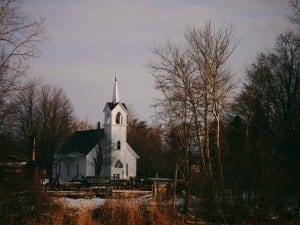
 This is a guest post written by Susan Fontaine Godwin at Christian Copyright Solutions. If you would like to submit a guest post to the site, please contact me and let me know.
This is a guest post written by Susan Fontaine Godwin at Christian Copyright Solutions. If you would like to submit a guest post to the site, please contact me and let me know.
Where confusion reigns… myths abound, and in the Christian community there’s widespread confusion regarding the US Copyright Law and how it impacts church activities.
I have been working with churches and ministries for 30 years, and I often hear a very common cry for help when I consult with churches or present a conference workshop:
“There are so many myths floating around about copyrights, could you please bring some light and uncover the truth behind some of the most common legends?”
Myths often spread when there are misunderstandings, and there’s often a great deal of confusion because of the complexities and details of the U.S. Copyright Law. So, let’s start with some important basics that will bring light to five common myths.
We’ll start with one of the most common myths I hear:
Myth 1: Because We’re a Nonprofit Church, the Copyright Law Does NOT Apply to Us
False. With the exception of the Religious Service Exemption (US Copyright Law’s Section 110[8]), the legal requirements for use of copyrights by nonprofit religious organizations are pretty much the same as any business or organization. There are some other possible exemptions or limitations, such as the nonprofit concert exemption and aspects of Fair Use, but they apply to any type of organization and are not specific to just churches or
nonprofit religious organizations.
The Religious Service Exemption (RSE) is a “NARROW exception to copyright protection,” according to Federal Court. It’s critical to understand the narrow limitation of The Copyright Act…it narrowly limits the privilege accorded to religious uses to performance of a literary or musical work, or display of a work. It is not a broad or blanket exemption that applies to a broad use of copyrights and exclusive rights throughout church (or other religious organizations) activities.
Although it is a narrow exception, it’s important for church and ministry leaders to understand the benefits and limitations of the RSE. He re is what the exemption states:
…performance of a nondramatic literary or musical work or of a dramaticomusical work of a religious nature or display of a work, in the course of services at a place of worship or other religious assembly” shall not constitute infringement of copyright.
It’s vital to note that the RSE only cover two basic types of copyrights (there are eight):
- Non-Dramatic Literary
- Music – Religious and Secular (including dramaticomusical works of a religious nature)
And it only cover two exclusive rights (out of six) of the copyright owner:
- Public Performance
- Public Display
In addition, it specifies that the performance or display of music or literary work must be in the course of services at a place of worship or other religious assembly.
As you can see, there are many types of copyrights (like audiovisual, visual images, dramatic, choreography, sound recordings and architecture) and exclusive rights
(like reproduction, derivative and distribution) that are NOT included in the Exemption.
Myth #2: If We’re Not Selling the CDs or DVDs We Make, We Don’t Have to Get a License for Recording Songs. We’re not Making Money on What We’re Doing
False. Whether you are selling or making a commercial profit does not affect your legal obligation to obtain permission from the song copyright owner. The right to reproduce the original copyright, in this case in the form of making copies of CDs and DVDs, is the exclusive right of the copyright owner and requires permission.
The copyright owner may consider granting gratis permission in some cases, but they will usually issue a license for the right to reproduce the song and charge some type of royalty fee (the current rate for CDs and MP3s is $.091 per song per unit 5:00 minutes or under). A statutory compulsory license can also be obtained through the US Copyright Office for a song that has been recorded at least once prior to your reproduction of it.
Myth #3: Our Church Doesn’t Need Performance Rights Licenses from ASCAP, BMI and SESAC
False. Church leaders often overlook the variety of ways that music is played and performed throughout their facilities, and even satellite campuses. Apart from the Religious Service Exemption, the Copyright Law views churches and ministries as any other organization when it comes to licensing for performance rights.
Let’s look at some basic definitions to help lay the groundwork for understanding performance licensing. The legal definition of a performance is an instance of music being performed
in a place open to the public or at any place where a substantial number of persons outside of a normal circle of a family and its social acquaintances is gathered.
Most church performances fit those criteria. A performance license grants permission to have these public performances, whether it is a live performance or playing of prerecorded music.
Performance licenses are controlled and managed by performing rights organizations or “PROs.” The three PROs in the United States are ASCAP , BMI and SESAC. For the most part, every songwriter and publisher who wants to be paid performance royalties is registered with one of these three organizations, which represent more than 20 million songs. PROs collect performance license fees for a wide range of uses, from Internet, radio and TV broadcast to stadiums and restaurants. All three PROs have partnered with CCS’s PERFORMmusic to provide a onestop church and religious organization performance license for all of their songs.
Churches play and perform music in a wide variety of activities and events throughout their facilities, including:
- Concerts
- Social events like harvest events, dinners and fundraisers
- Music on hold
- Dance and aerobic classes
- Before and after worship services
- In coffee shops and bookstores
- Special holiday productions
- Youth events
- Movie nights
- Seminars
Myth #4: Churches are Not Allowed to Play or Perform Secular Songs in Their Service
False. Actually, the Religious Service does not distinguish between religious and secular music. The U.S. Religious Service Exemption in the Copyright Law Section (110[3]) allows you to freely perform or display copyrighted music in your worship service. However, dramatico-musical works (a type of musical work) of a religious nature provides for sacred music that might be regarded as “dramatic” in nature, such as oratorios, cantatas, and choral services. But it is not intended to cover performance of secular operas, plays or motion picture, even if they have an underlying religious or philosophical theme and take place in the course of religious service.
Knowing how to identify copyright myths and figure out what’s True and what’s False may require some help. Some myths are based on a fairly complex aspect or section of the U.S. Copyright Law, such as the application of the Fair Use doctrine. And it’s often wise to seek legal counsel (from a Copyright or IP attorney) who can analyze and provide guidance for specific situations. In other cases, you may need to learn more of the basic building blocks of Copyright Law and how it impacts your church’s activities, and I recommend you download CCS’s free Copyrights 101 Fact Sheet for you and your staff. The Copyrights 101 Fact Sheet is one of the many FREE educational documents that are available at The Copyright Coach.
Myth #5: If I Only Use 10 Seconds of a Song or of a Video Clip, We don’t need to ask permission
False (Probably). In most cases, the length of a recording or any copyrighted material does not alter the requirement to obtain permission from the copyright owner. In some cases, it may impact the cost or rate of the license, but it does not exempt you from first asking and receiving copyright clearance from the owner before using it.
Some may argue that the Copyright Law Fair Use doctrine allows for using a small portion of a copyrighted work without permission, but this doctrine is quite complicated in its application and we recommend that you either obtain legal advice from an attorney about your particular situation or read Chapter 3 in the CCS eBook,“ Solve the Puzzle of Copyrights,” in which Fair Use is addressed by Brock Shinen, Esq., before you assume Fair Use applies to your use. There are some pretty interesting court rulings that have found in favor of the copyright owner for use of as little as 1% of copied material, as well as 29 seconds of a 40-minute copyrighted musical work.
About the Author
 Susan Fontaine Godwin is Christian Copyright Solution’s founder/CVO, an educator and longtime member of the Christian arts community with 30 years of experience in the Christian media industry, church copyright administration and copyright management. Susan is an author and speaker and frequently writes for several magazines and online publications. She serves as an adjunct professor at the University of Mobile. You can follow her on Twitter and Facebook.
Susan Fontaine Godwin is Christian Copyright Solution’s founder/CVO, an educator and longtime member of the Christian arts community with 30 years of experience in the Christian media industry, church copyright administration and copyright management. Susan is an author and speaker and frequently writes for several magazines and online publications. She serves as an adjunct professor at the University of Mobile. You can follow her on Twitter and Facebook.
Want to Reuse or Republish this Content?
If you want to feature this article in your site, classroom or elsewhere, just let us know! We usually grant permission within 24 hours.